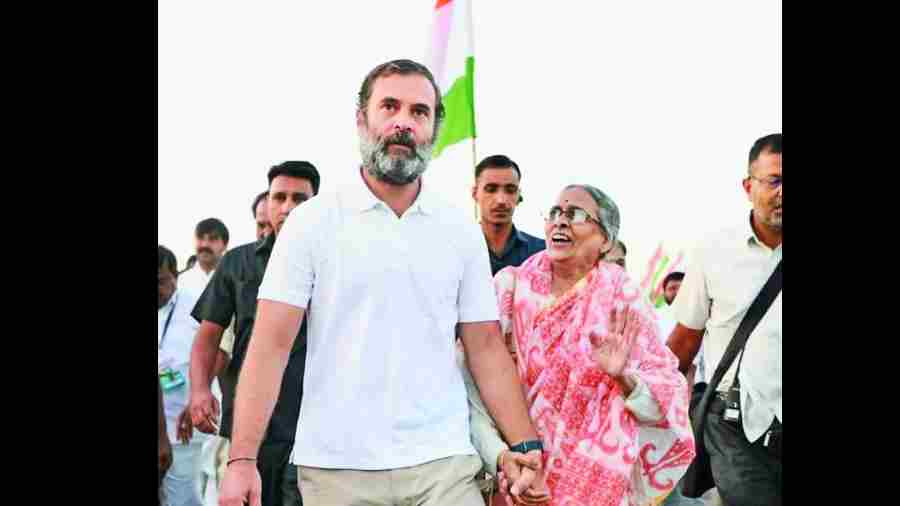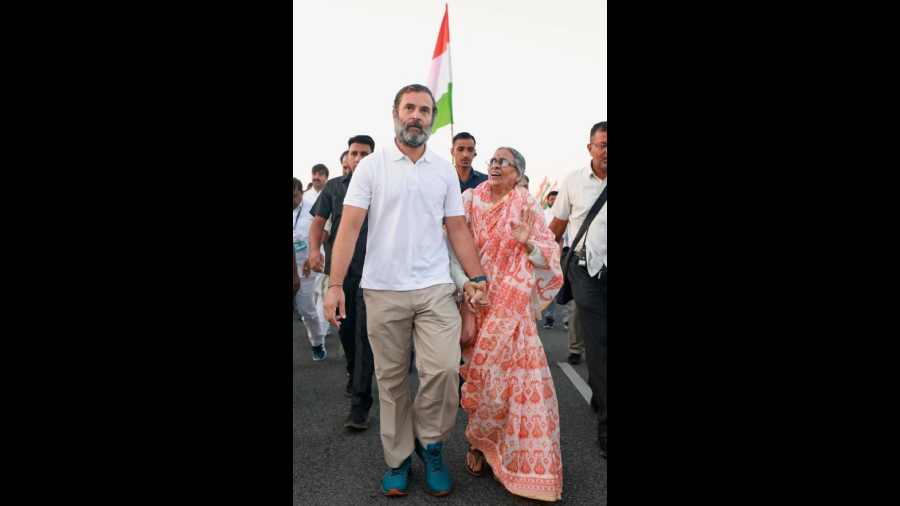The Bharat Jodo Yatra, which has touched five states so far, is not just a desperate attempt by the Congress to connect with people and preserve the constitutional culture but has the potential to transform Indian politics, some academics and activists have said.
Some, however, cautioned that it remains to be seen how much support the walkathon — which has covered over 1,400km since its September 7 launch — receives once it crosses Maharashtra and enters the Hindi heartland.
The BJP has so far responded to the Yatra merely with defamatory allegations that have been easy to prove false, innuendos and ridicule, ignoring the issues of high prices, joblessness and divisive politics that it has raised.
But the programme, which has attracted thousands across age groups, castes, religions and economic strata, has generated curiosity and hope in civil society and prompted some to shed their negative opinion about Rahul Gandhi, conversations with academics and activists suggest.
There seems a consensus that the real-life issues flagged by the Yatra have found resonance among the people, and the walkathon has become a subject of discussion countrywide.
Political scientist Zoya Hasan told The Telegraph: “Finally, the Congress has its feet on the ground. It is not just a routine padyatra. The political context defined by division, hate and inequalities makes this a strong ideological counter to the RSS-BJP.
“Its success so far has shown that there is still space in the country for an inclusive politics that the Congress represents and can tap into.”
Hasan added: “The padyatra is a noble way to rebuild political capital and galvanise voters for the 2024 elections. It has stirred hopes well beyond the traditional support base of the Congress (and highlighted the) shared need to stand up to the party in power today.
“It has garnered massive support in the southern states. It remains to be seen how the Yatra performs once it crosses Maharashtra and moves into the Hindi heartland.”
Apoorvanand, a Delhi University teacher, said the country was desperately waiting for “this kind of a constructive, positive energy” for some years.
“The toxic politics and rising economic inequality created so much cynicism…. The Bharat Jodo Yatra finally demolishes the perception that secularism is not central to our politics. Though it is good for the Congress, it is very important for society and the country. Nehru said in 1952 that opposing communalism was more important for him than winning elections,” he said.
“The media refused to provide the platform for a meaningful conversation, making it imperative for the leader of the main Opposition party to establish a direct connect with the people. Rahul Gandhi’s decision to embark on a Kanyakumari-to-Kashmir padyatra has generated enormous enthusiasm and hope in civil society. Even those who nurture reservations against the Congress for other reasons have embraced the Bharat Jodo Yatra.”
Asked whether the Yatra would bring political gains to the Congress or remain restricted to the social cause of uniting the people, he said: “It’s an irony that the social and political are delinked. It is good that the Congress is on the road. (The word) ‘Congress’ means congregation --- the MLAs and MPs aren’t the party, it has to bring different sections of society together.
“Congress leaders started thinking they were a party of power. This Yatra has restored the purpose of politics and brought a sense of purpose among Congress leaders and workers.”
Nikhil Dey, activist and member of the Mazdoor Kisan Shakti Sangathan, said: “It won’t be enough for the BJP to make snide remarks and indulge in pinpricks. The kind of initiative that the Bharat Jodo Yatra is should trigger a healthy political competition. Let the BJP too come out with a progressive programme for mass mobilisation.”
Dey added: “There can’t be any negativity about this Yatra; it is raising all the relevant issues. Rahul Gandhi is not meeting only political workers, he is meeting ordinary citizens, representatives of different social and business groups and activists.
“This Yatra has created a wider platform for engagement, for a broader democratic consultation. People are not mobilised for lecturing by politicians; they (Congress leaders) are listening. It has created an unprecedented accessibility.
“Such an endeavour will help the democratisation of our political system. Insecurity had peaked among the people; the social fabric was in tatters. This Yatra has regenerated hope about the democratic culture. Apart from the issues the Congress is raising, discussions are happening on the sidelines on a wide range of other issues. The government will have to pay heed and respond.”
Savita Singh, professor at the School of Gender and Development, Indira Gandhi National Open University, stressed the importance of the political leadership directly engaging with the subaltern and the marginalised, women in particular.
“The Bharat Jodo Yatra is a well conceived strategy of the Congress to do politics from below,” Singh said.
“As long as the Congress was the ruling party, it had a contradictory path to traverse. Often, only a section of citizens could be included in the representative politics. It is one thing to represent in theory, quite another to include the material interest of the same section in reality.”
She added: “Connect with people who bring you to power. Come to know the people, their genuine material needs, and act towards their realisation through policies, that is what has to be the next thing in realpolitik for the Congress.
“The present regime is only dividing the Indian people in the name of religion or caste; the Opposition needed to bring them together for political purposes.”
Singh said: “Today, in the era of post-democratic governance informed by neoliberal economic policies… the Indian state promises not equality but growth of the economy. The illusion is snatched too now. The Congress has understood this stark reality now. It is this reality, the reality of the realpolitik of a communal authoritarian regime, that has forced an aspirant Congress party to hit the roads.”












